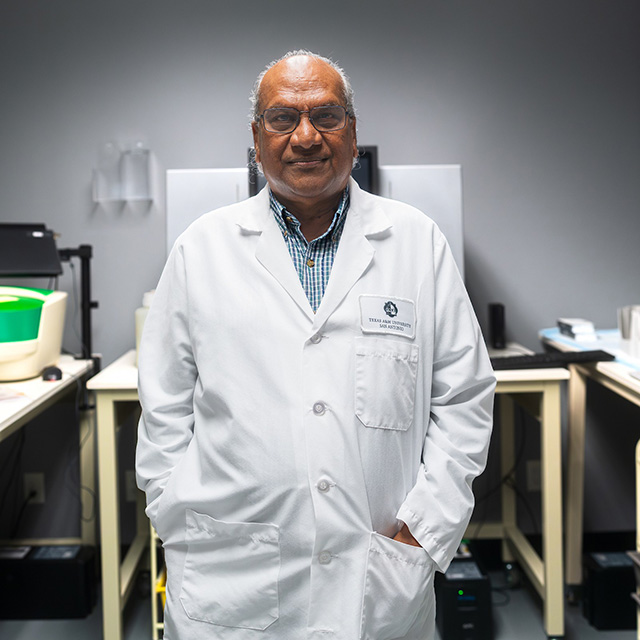Childhood obesity has long been recognized as one of the most pressing public health challenges in San Antonio and across Texas. But for University researchers, the fight against obesity isn’t just about numbers on a scale—it’s about decoding how poverty, diet, and environmental factors leave lasting biological marks that shape children’s health for life.
That’s the driving force behind a new $400,000 grant awarded to A&M–San Antonio through the Texas Higher Education Coordinating Board’s Minority Health Research and Education Grant Program (MHGP). The competitive statewide program—funding only 15 institutions in its 2025 cycle—supports innovative initiatives that address health disparities among underserved populations.
Leading the two-year study is Dr. Ravindranath Duggirala and co-principal investigator Dr. Srinivas Mummidi. Both are members of the University’s Public Health Genetics and Genomics Group, a team of experts focused on the genetics and genomics of diseases such as type 2 diabetes and obesity.
They are joined by Elizabeth Lutz, executive director of Bexar County’s The Health Collaborative, and Dr. Jun Fan, director of molecular genomics core at the Texas A&M Institute for Genome Sciences & Society in College Station. Together, this interdisciplinary team is exploring how modifiable environmental and socioeconomic factors—such as diet, physical activity, and neighborhood conditions—affect obesity and related metabolic risks in Mexican American youth.
“Childhood obesity doesn’t occur in isolation,” said Duggirala. “It’s shaped by where children live, what they eat, their family’s economic situation, and even the stressors they experience. Our research aims to uncover how these external factors can actually alter biological processes and influence long-term health.”

The project builds on the San Antonio Family Assessment of Metabolic Risk Indicators in Youth study. Headed by Duggirala, who serves as principal investigator, the study has collected biological and lifestyle data from hundreds of Mexican American children and adolescents.
Using those samples, Duggirala’s team will analyze DNA methylation—a process that turns genes “on” or “off” in response to environmental stressors. The primary analysis of the extracted DNA will occur under the supervision of Fan at the Texas A&M Institute for Genome Sciences & Society.
“The analysis provides insight into how environmental factors influence gene regulation,” said Fan. “By identifying methylation changes associated with obesity and other metabolic disorders, we can uncover modifiable environmental triggers—such as diet, physical activity, and exposure to pollutants—that contribute to disease risk and progression.”

The first year of the study will focus on generating methylation data and conducting an environment-wide analysis, examining how environmental variables relate to obesity and metabolic syndrome. The second phase will involve an analysis to determine how these environmental exposures may cause biological changes leading to disease.
While the science behind the project is complex, its ultimate goal is simple: translate research into real-world impact. That’s where Lutz and The Health Collaborative play a critical role. The nonprofit is a network of residents, community organizations and businesses dedicated to improving community health.
Lutz will help bridge the gap between academic research and community engagement. Her organization connects with hospitals, public agencies and nonprofits across South Texas to advance collective health initiatives.
Once the data reveals which factors most strongly influence childhood obesity, Lutz and the team will host workshops, community meetings, and outreach events to discuss how families, schools, and policymakers can address the risks.
The project’s community outreach component will also engage A&M–San Antonio students, offering them hands-on research and service-learning opportunities. Four student researchers will be recruited to assist with data analysis and community translation, gaining valuable experience at the intersection of science and public health.
“We want our students to see how molecular research can directly improve lives in the neighborhoods where many of them grew up,” Duggirala said.
The Minority Health Research and Education Grant Program was established to support projects that focus on medically underserved populations who face disparities in health access and outcomes within the state of Texas, where nearly 35% of school-age children are overweight or obese, according to the Texas Department of Health.
Duggirala noted that childhood obesity remains a multifactorial disease—one shaped by genetics, environment, and social disparities. By combining molecular genomics with community-based action, A&M–San Antonio’s team hopes to create a model for holistic health research that other regions can replicate.
As the two-year project progresses, the research team envisions far-reaching benefits. Their findings could inform nutrition guidelines, policy decisions and community health initiatives designed to prevent obesity and its long-term consequences.
“This study positions A&M–San Antonio as a leader in health disparities research,” said Mummidi. “By combining advanced genomics with real community engagement, we’re not only addressing a local crisis—we’re contributing to the future of personalized and preventive medicine and empowering communities to improve the health of future generations.”